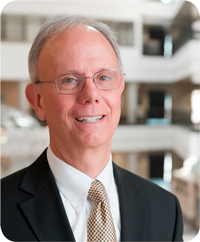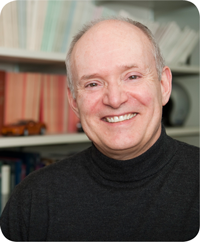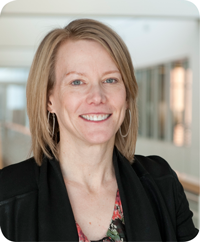
Carlson Leadership Transitions
Friday, April 1, 2011
By Kevin Moe
New Deans Named in MBA and Undergraduate Programs
The MBA and Undergraduate Programs at the Carlson School will experience leadership changes this summer as two new associate deans begin their service. At the same time, the Carlson School honors the current deans who are stepping down and thanks them for their service to their respective programs and to the school as a whole.
MBA Programs
Professor Art Hill, the John & Nancy Lindahl Professor for Excellence in Business Education, will assume the role of associate dean of the Carlson School’s MBA Programs, effective June 1. Hill replaces Professor Ed Joyce, who will conclude five years of service in this key leadership role on May 31 and return to the faculty.
Since 1992, Hill has served as a full professor in the Carlson School’s Department of Operations and Management Science, where he has delivered consistently strong instruction in the core of both the Full-Time and Executive MBA programs. He earned a BA in mathematics from Indiana University, an MS in industrial administration, and a PhD in management from the Krannert School of Management at Purdue University. He also is a Fellow of the American Production Inventory Control Society and has been a visiting professor at Indiana University, IMD International (Lausanne, Switzerland), Wits Business School (Johannesburg, South Africa), and the National University of Singapore. He founded the Carlson Consulting Enterprise; has authored more than 70 research articles on supply chain management, service quality, and process improvement programs; and has consulted for a number of leading firms in the United States and Europe.
He was the editor-in-chief of the Journal of Operations Management and helped found three professional societies: the Production and Operations Management Society, the Operations Management Association, and LEAN. His recent books include The Encyclopedia of Operations Management – 2010 Edition and Personal Operations Management – Lean Principles for Getting Good Things Done.
Joyce joined the Carlson School in 1981 as a faculty member in the Department of Accounting. In 2006, he assumed the role of associate dean, in which he supervised significant enhancements in the MBA Program. Among the many accomplishments under his leadership are the implementation of new curricula in the Full-Time and Part-Time MBA programs, a restructuring of the School’s Enterprises to increase both their centrality in the curriculum and their academic content, the consolidation of the MBA program offices and increased synergies among MBA programs, and a marked increase in the quality of admissions processes.
Undergraduate Program
Following 10 years of service, Professor Robert Ruekert will step down from his role as associate dean of the Carlson School’s Undergraduate Program, effective May 31. He will return to his faculty role after a one-year sabbatical leave. Assuming this important role, effective June 1, will be Professor Connie Wanberg, the Industrial Relations Faculty Excellence Chair in the Department of Human Resources and Industrial Relations (HRIR).
Wanberg joined the Carlson School in 1996 as a professor in the Department of Human Resources and Industrial Relations. She earned a BS in psychology from Moorhead State University and an MS and PhD in Industrial-Organizational Psychology from Iowa State University. She served as chair of the HRIR department from 2006 to 2009. She has published 28 articles in refereed journals, as well as numerous book chapters, and has served as an editorial board member for Personnel Psychology, Journal of Applied Psychology and Human Performance. She also has presented at numerous conferences throughout the world and has served as a guest instructor at Universite Jean Moulin in Lyon, France and the Fundacíon Ortega y Gasset in Toledo, Spain. She has extensive consulting and research experience and is a Fellow of the Society for Industrial and Organizational Psychology.
Ruekert joined the faculty of the Carlson School in 1981 and has been continuously involved with its Undergraduate Program ever since. In 2001, he assumed the role of associate dean, in which he led several initiatives to improve the quality of the program, including the development of a management major, the founding of an upper and lower division honors program, the implementation of an international experience graduation requirement, and the development of an academic major in nonprofit/public sector management. In addition, under his leadership, the Undergraduate Program grew by more than 50 percent, experienced a complete redesign of its curriculum, became the proud occupant of the newly constructed Herbert M. Hanson Jr. Hall, and achieved its current top-20 ranking by U.S. News and World Report.
I have tremendous confidence that our students of today will definitely change both the corporate and social landscape in deep and sustainable ways.
Reflections on Undergraduate Business Education
By Professor Robert Ruekert, Associate Dean
Editor’s Note: We asked Professor Robert Ruekert to provide some thoughts on his tenure as associate dean.
For many faculty administrators, tenure in office can be rather short. Either such talented people find they enjoy and are successful in their positions and are asked to move up the academic hierarchy, or they find that their true calling is what brought them to academics in the first place—teaching and research—and return to their non-administrative status. Thus, it is unusual to find someone like myself who has found such satisfaction in serving as associate dean for the Undergraduate Program for the past 10 years.
As I reflect on that 10-year period, I find that the world has indeed changed in broad, powerful ways that have affected all that we do in our Undergraduate Program. While these changes are many, I group them into three major themes: including students, faculty, and the strategic importance of undergraduate education.
The Undergraduate Program at the Carlson School has seen tremendous growth in interest from both incoming freshmen and transfer applicants. We have experienced double-digit growth in applications year after year. This year we have more than 6,500 applications for about 490 seats in our freshman class. The key result of this growth in interest is that our student body consists of the very best students, capable of extraordinary academic achievement. But our students today are also quite different than their counterparts from a decade ago. As part of the Millennial Generation, many of our current students are deeply interested in changing the world. They want to make a difference in their communities, not just by volunteering, but by building new organizations designed to create significant social change. I have tremendous confidence that our students of today will definitely change both the corporate and social landscape in deep and sustainable ways.
The role and challenges facing faculty is a second area of change over the past decade; in many ways following the demands placed by our student body. The classroom experience of today is dramatically different from that of 2001. Gone are days of faculty lecturing for full class periods. The typical class period now involves student interaction in the learning process. Small group exercises illustrating and deepening the learning of concepts permeate most class sessions. Group assignments and projects are the norm. The use of technology continues to grow both in the classroom and in tools that organize everything from the course syllabus to quizzes. Faculty are also being asked to be more connected to students outside of the classroom, and to act as mentors to assist in their students’ personal and professional development. Increasingly common is having faculty develop courses that combine learning on campus with education abroad. In short, the demands on faculty have grown and diversified considerably over the past 10 years. Never have faculty been a more important factor in our program’s success.
The third change I would like to highlight has been the growing strategic importance of undergraduate business education to the health of the business school as a whole. Ten years ago, our industry, especially the top 50 business schools, was primarily focused on graduate education, especially the MBA. Across the nation, a call for investment in undergraduate education fell on deaf ears. I am very proud of the fact that the Carlson School was a national leader in recognizing the critical importance of undergraduate education in meeting the school’s strategic objectives. We launched an expansion of our undergraduate student body and built a world-class facility, Hanson Hall, to serve our students’ needs. We also committed to a new curriculum that now requires all students to have an international experience as part of the degree. In short, undergraduate education at the Carlson School is one of our hallmarks. As one of our recent accreditation team members commented, the Undergraduate Program is a “jewel in the crown of the Carlson School.”
As I prepare to leave my position as associate dean, I am truly honored to have been a part of these massive changes we have witnessed. The Undergraduate Program is on very solid ground and is meeting all of its strategic objectives. I am also confident that these trends will continue, as they have been engrained in our school’s culture.
I am also extremely thankful for the support I have received from my bosses—the deans who have served over this 10-year period, the tremendous faculty who have stepped up to enhance what we do, my wonderful group of highly professional and caring staff, and to the hundreds of students I have gotten to know over these years. I am truly a lucky man.


